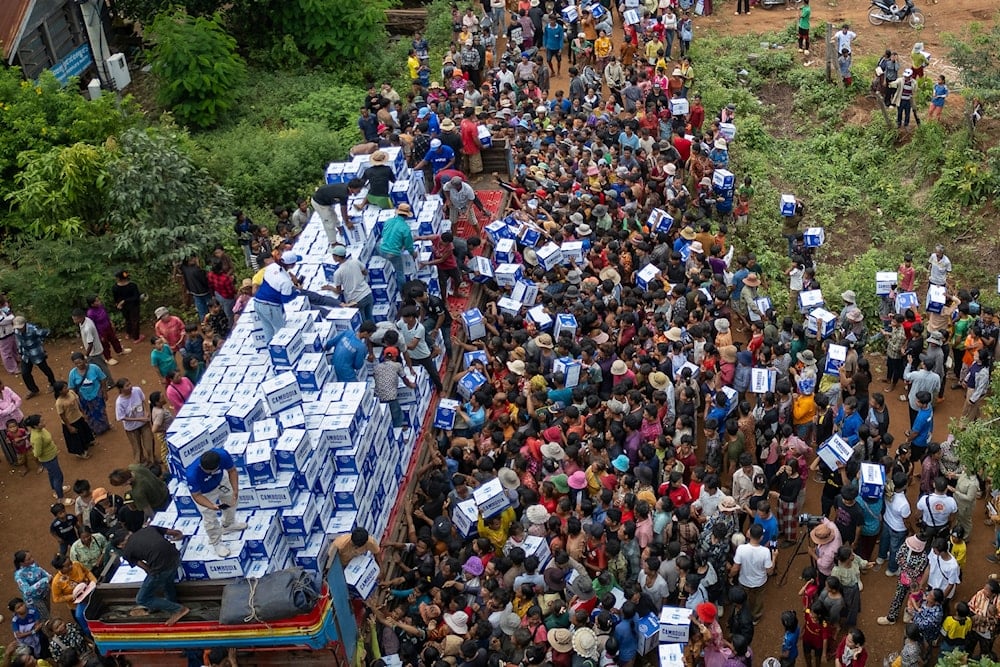Cambodia-Thailand border clashes persist despite ceasefire efforts
Despite international calls for calm, Cambodia and Thailand continue border clashes near ancient temples, with dozens killed and over 200,000 displaced as ceasefire talks falter.
-

Displaced Cambodians receive water at the Battkhao Resettlement Camp in Oddar Meanchey Province, Cambodia, Saturday, July 26, 2025, as border clashes between Thailand and Cambodia entered their third day. (AP Photo/Anton L. Delgado)
Fighting continued for a fourth day on Sunday along the Cambodia-Thailand border, despite expressed willingness from both sides to negotiate a ceasefire following late-night intervention by US President Donald Trump.
The ongoing Cambodia-Thailand border tensions, the most violent in years, has resulted in at least 33 confirmed deaths and the displacement of over 200,000 people.
The border region, characterized by forested hills and agricultural land, has seen escalated military activity involving jets, tanks, and ground troops. The two countries dispute several stretches of their 800km-long border, particularly areas surrounding heritage sites.
Fighting continues amid ceasefire proposals
Fresh artillery exchanges erupted early Sunday near two ancient temples situated between northern Cambodia and northeast Thailand. Despite both nations agreeing in principle to negotiate a ceasefire, clashes have intensified.
Cambodian Defense Ministry spokesperson Maly Socheata reported that Thai forces launched attacks at approximately 4:50 AM, targeting areas around the contested temples. Journalists in Samraong, roughly 20 kilometers from the frontline, reported hearing frequent artillery fire. Alternatively, Thai Army Deputy Spokesman Ritcha Suksuwanon claimed Cambodian forces initiated the artillery fire at 4:00 AM.
According to official figures, the conflict has killed seven Thai soldiers and 13 Thai civilians. Cambodia reports five military and eight civilian deaths. The violence has displaced more than 138,000 individuals from Thai border regions and 80,000 from Cambodia.
Accusations from both sides
Tensions remain high, with both countries accusing each other of violating ceasefire agreements. Thailand's Foreign Ministry said that Cambodian forces targeted civilian homes in Surin province, stating, "Any cessation of hostilities cannot be reached while Cambodia is severely lacking in good faith and repeatedly violating the basic principles of human rights and humanitarian law."
Cambodia's Defense Ministry rejected the claims, asserting that Thai forces committed "deliberate and coordinated acts of aggression." Cambodia also accused Thai forces of using cluster munitions, while Thailand claimed Cambodian forces had targeted civilian infrastructure, including hospitals.
Diplomatic interventions
US President Donald Trump held late-night discussions with both Cambodian Prime Minister Hun Manet and Thailand's acting Prime Minister Phumtham Wechayachai. He stated that the two leaders had agreed to meet and "quickly work out" a ceasefire.
Hun Manet confirmed Cambodia's acceptance of "an immediate and unconditional ceasefire" and indicated that Foreign Minister Prak Sokhonn would coordinate with the Thais through US Secretary of State Marco Rubio. He also warned Bangkok against retracting its commitments.
Phumtham Wechayachai said Thailand agreed in principle to the ceasefire and was ready to begin talks "as soon as possible."
Following an emergency United Nations Security Council session, Cambodia's UN Ambassador Chhea Keo reiterated his country's call for an immediate ceasefire and peaceful resolution. Additionally, UN Secretary-General Antonio Guterres urged both nations to halt hostilities and engage in dialogue.

 3 Min Read
3 Min Read










